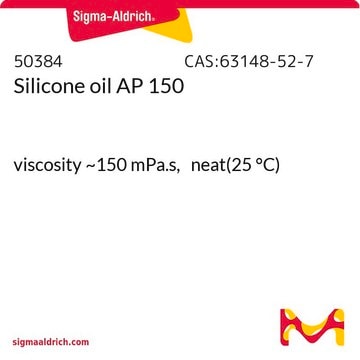85409
Silicone oil
for oil baths (from −50°C to +200°C)
Sinónimos:
Dimethyl polysiloxane
Iniciar sesiónpara Ver la Fijación de precios por contrato y de la organización
About This Item
Fórmula lineal:
[-Si(CH3)2O-]n
Número de CAS:
MDL number:
UNSPSC Code:
12352100
NACRES:
NA.21
Productos recomendados
grade
for oil baths (from −50°C to +200°C)
Quality Level
vapor density
>1 (vs air)
vapor pressure
<5 mmHg ( 25 °C)
5 mmHg ( 20 °C)
form
oil
refractive index
n20/D 1.403 (lit.)
n20/D 1.406
viscosity
100 mPa.s(20 °C)
bp
>140 °C/0.002 mmHg (lit.)
density
0.967 g/mL at 20 °C
¿Está buscando productos similares? Visita Guía de comparación de productos
General description
Silicone oil is typically used for oil baths in research labs for reactions that require heating/reflux temperatures in the range of -50°C to +200°C. Oil baths provide more uniform heat in comparison to other heating devices.
Silicone oil is useful for the preparation of oil baths having a temperature in the range of -50°C to +200°C.
Application
Silicone oil has been used for the protection of carbon steel alloy samples in a study. Silicone oil has also been used as a heat reservoir during NMR (Nuclear Magnetic Resonance) analysis.
Storage Class
10 - Combustible liquids
wgk_germany
WGK 1
flash_point_f
214.0 °F - closed cup
flash_point_c
101.1 °C - closed cup
ppe
Eyeshields, Gloves
Elija entre una de las versiones más recientes:
¿Ya tiene este producto?
Encuentre la documentación para los productos que ha comprado recientemente en la Biblioteca de documentos.
Los clientes también vieron
Low-temperature atomic layer deposition of Al2O3 thin coatings for corrosion protection of steel: surface and electrochemical analysis.
Diaz B, et al.
Corrosion Science, 53(6), 2168-2175 (2011)
M Findeisen et al.
Magnetic resonance in chemistry : MRC, 45(2), 175-178 (2006-12-13)
Most established NMR thermometers rely on temperature-dependent chemical shift differences measured from samples that are either neat or concentrated solutions (e.g. ethylene glycol, methanol). These are unsuitable for modern cryoprobes on account of strong radiation damping resulting from the high
John R Fowler et al.
The Orthopedic clinics of North America, 44(3), 425-431 (2013-07-06)
Radial head fractures without associated bony or ligamentous injury can be safely treated with internal fixation, if possible, or arthroplasty if nonreconstructable. However, nonreconstructable radial head fractures in association with elbow dislocation and/or ligamentous injury in the elbow or forearm
M Krutyeva et al.
Physical review letters, 110(10), 108303-108303 (2013-03-26)
We present neutron spin echo experiments that address the much debated topic of dynamic phenomena in polymer melts that are induced by interacting with a confining surface. We find an anchored surface layer that internally is highly mobile and not
Amir Sanati Nezhad et al.
Proceedings of the National Academy of Sciences of the United States of America, 110(20), 8093-8098 (2013-05-01)
Tip-growing cells have the unique property of invading living tissues and abiotic growth matrices. To do so, they exert significant penetrative forces. In plant and fungal cells, these forces are generated by the hydrostatic turgor pressure. Using the TipChip, a
Nuestro equipo de científicos tiene experiencia en todas las áreas de investigación: Ciencias de la vida, Ciencia de los materiales, Síntesis química, Cromatografía, Analítica y muchas otras.
Póngase en contacto con el Servicio técnico



